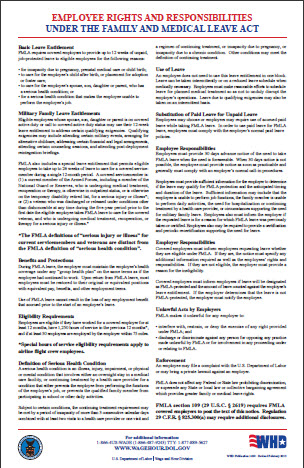 By Jude Biggs
By Jude Biggs
The U.S. Department of Labor (DOL) unceremoniously published new FMLA forms with an expiration date of May 2018. The only significant revision is the addition of a notice to employees and health care providers on the medical certification forms informing them not to reveal genetic information in violation of the Genetic Information Nondiscrimination Act (GINA).
Genetic Information Off-Limits to Employers
GINA, which went into effect in late 2009, applies to employers with 15 or more employees. It not only makes it unlawful for employers to discriminate or retaliate against employees and applicants because of their genetic information, but it also prohibits employers from requesting, requiring, purchasing or disclosing genetic information.
Genetic information is defined to include information about an individual’s genetic tests and the genetic tests of an individual’s family members, genetic services and an individual’s family medical history. Family medical history is included because it often reveals whether someone has an increased risk of getting a disease, disorder or condition in the future.
FMLA and GINA Intersect
Under the FMLA, employers may require that an employee requesting leave for his or her own serious health condition or to care for a family member with a serious health condition provide a medical certification form completed by a health care provider. Through the medical certification form, health care providers provide medical facts about the condition, such as the expected duration, the nature of treatments, and whether the employee is unable to perform his or her job functions as well as information about the amount of leave needed. In some circumstances, responses by health care providers may reveal genetic information that is protected by GINA.
Because of this intersection of the FMLA and GINA, the regulations implementing GINA offer suggested language that covered employers may use to specify that no genetic information should be provided when medical information is offered to support a request for FMLA leave. By utilizing this safe harbor language and advising the employee and the health care provider not to provide genetic information when completing the FMLA medical certification form, the inadvertent receipt of genetic information by the employer will not be deemed a violation of GINA.
In the past, the DOL’s model FMLA certification forms lacked this GINA safe harbor language. Consequently, employers had to offer it separately or utilize their own FMLA forms in order to take advantage of GINA’s safe harbor provision. Now, the DOL has included the following language in its model FMLA certification forms:
Do not provide information about genetic tests, as defined in 29 C.F.R. § 1635.3(f), or genetic services, as defined in 29 C.F.R. § 1635.3(e).
The certification form for an employee’s own serious health condition includes a statement that no information about the manifestation of disease or disorder in the employee’s family members, 29 C.F.R. § 1635.3(b), should be provided.
Use New FMLA Forms Or Update Your Own Forms
The new FMLA model forms, with fillable form fields, are linked here:
- WH-380-E Certification of Health Care Provider for Employee’s Serious Health Condition
- WH-380-F Certification of Health Care Provider for Family Member’s Serious Health Condition
- WH-381 Notice of Eligibility and Rights & Responsibilities
- WH-382 Designation Notice
- WH-384 Certification of Qualifying Exigency For Military Family Leave
- WH-385 Certification for Serious Injury or Illness of Covered Servicemember — for Military Family Leave
- WH-385-V Certification for Serious Injury or Illness of a Veteran for Military Caregiver Leave
Take steps now to update your FMLA practices to use the new DOL forms, or if you use your own FMLA forms, update them to reflect the added recommended language.


